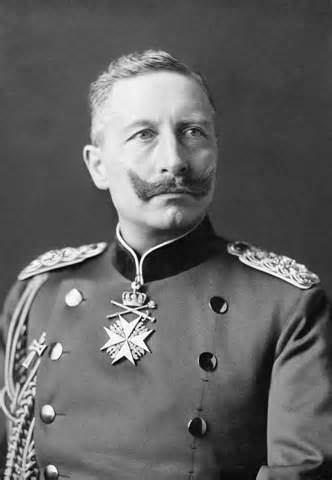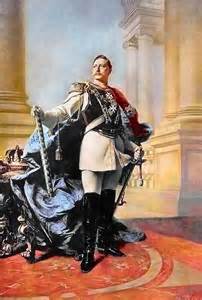Wilhelm II: Germany's Last Kaiser
Wilhelm II was the third ruler of the newly united Germany and the leader of that country during World War I. Wilhelm had strong ties to the Prussian aristocracy. His father was Prince Frederick III of Prussia, and his mother was Victoria of the United Kingdom. When Wilhelm was born, in 1859, his great-uncle was King Frederick William IV of Prussia, and his grandfather, Wilhelm, was heir to the throne. Two years later, his grandfather became Wilhelm I; in 1888, his father became Frederick III. Frederick ruled for only 99 days before he died of cancer. On June 15, 1888, Wilhelm became Kaiser Wilhelm II, the leader of the German Empire. Wilhelm was born with one arm shorter than the other. As well, both sides of his family had a history of mental illness. Both of these things are believed to have led to Wilhelm's tendencies toward caprice and impatience. He was, however, a bright child and a fast learner. He still had the power of the German Empire behind him, and he also had at his disposal the famous Chancellor Otto von Bismarck.
In 1881, Wilhelm married a woman named Augusta (known as "Dona"). The two were married until her death, in 1921. Together, they had seven children. Wilhelm married again the following year, to a woman named Hermine. While Wilhelm was growing up amid royalty, he watched his father and grandfather defer to Bismarck in the political and diplomatic realms. Bismarck gained for himself the titles of Prussian President and Foreign Minister in 1862 and then Chancellor of the newly united Germany, in 1871. He was used to calling the shots and supposed that he would continue to do so when the young Wilhelm became the Kaiser. Wilhelm wanted to play a much more active role than his grandfather had in governing the country, and this led to clashes with Bismarck. Each ended up working to undermine the influence of the other. A fierce disagreement over workplace legislation was the last straw, and Bismarck resigned his post. The Kaiser soon appointed a new Chancellor and then another, before finding one he could work with, Bernhard von Bulow. Wilhelm II proclaimed that Germany had embarked on a "New Course"; the result was an increasingly strong and isolated Germany. Wilhelm II was also a great fan of the arts and sciences. He sponsored a society for promoting scientific research (named after himself, of course) and an academy of sciences. He promoted the modernization of German medical practices and facilities. He also set his country on a course of reform in the realm of secondary education. One of the Kaiser's pet projects was the creation of a strong German navy. He found a kindred spirit in Alfred von Tirpitz, a naval officer. Together, they followed through on a plan to build a navy to match the strength of the British Navy. Wilhelm created a Naval Cabinet, separate from the Imperial Military Cabinet, in 1889, and created a new naval top officer, the Chief of the High Command of the Admiralty. As Germany spent more and more time, effort, and money on building ships of war, it also in 1895 built the Kiel Canal, which allowed the Navy to more quickly move ships between the Baltic Sea and the North Sea. Along the way, Wilhelm had angered the leaders of both Great Britain and France. The augmentation of the German Navy caused great alarm in Britain; a lesser complaint came from the British government after Wilhelm publicly supported South Africa in its 1899-1902 struggle against Britain, known as the Boer War (which Britain won). As well, France was still smarting from its relatively quick defeat in the Franco-Prussian War and wanted to curtail German influence throughout Europe. France and Britain patched up their longstanding differences enough to form the Entente Cordiale in 1904 and then joined with Russia to form the Triple Entente, an intended counter to Germany's Triple Alliance with Austria-Hungary and Italy.
The Austrian rejection of Serbia's response to the post-assassination ultimatum resulted in an Austrian declaration of war on Serbia, which resulted in a mobilization of the armed forces by Russia, which convinced Wilhelm to declare war on Russia. Thus it was that Germany entered the war, on August 1, 1914. The war went well for Germany initially, but things ground to a halt along wide swathes of the front and the Kaiser's armed forces soon faced a two-front war, facing Great Britain and France in the west and Russia in the east. In addition, Italy switched sides in 1915 and joined the war against the Central Powers. This was a scenario that the German Central Command didn't want, Wilhelm especially. As the war dragged on, becoming increasingly a war of attrition, the Kaiser relinquished control of the armed forces to his high command, most notably Field Marshal Paul von Hindenburg. The entry of the United States into the war, in 1917, was a shot in the arm to Allied efforts. On the other side, a severe shortage of manpower and money, coupled with Germany's increasing need to defend lands formerly held by Austria-Hungary, led to an exhausted, bankrupt Germany. The war came to an end in November 1918. In the waning days of the war, Wilhelm abdicated and went into exile in the Netherlands, where he spent the rest of his life. In 1922, he published his memoirs, in which he defended his actions throughout the war. No fan of the Nazis, Wilhelm spoke out against their rise, preferring instead a restoration of the monarchy, with Wilhelm's oldest grandson as the new Kaiser. Wilhelm II died on June 3, 1941, at his home in the Netherlands. He was 82. |
|
Social Studies for Kids
copyright 2002–2026
David White



 Bismarck had urged Wilhelm I to send his grandson on diplomatic missions to help the young Wilhelm gain international understanding and experience. So it was that the young Wilhelm visited the courts of both Austria-Hungary and Russia and as well gained an admiration for Bismarck.
Bismarck had urged Wilhelm I to send his grandson on diplomatic missions to help the young Wilhelm gain international understanding and experience. So it was that the young Wilhelm visited the courts of both Austria-Hungary and Russia and as well gained an admiration for Bismarck. Through his experience at the imperial court of Austro-Hungarian Emperor
Through his experience at the imperial court of Austro-Hungarian Emperor 
